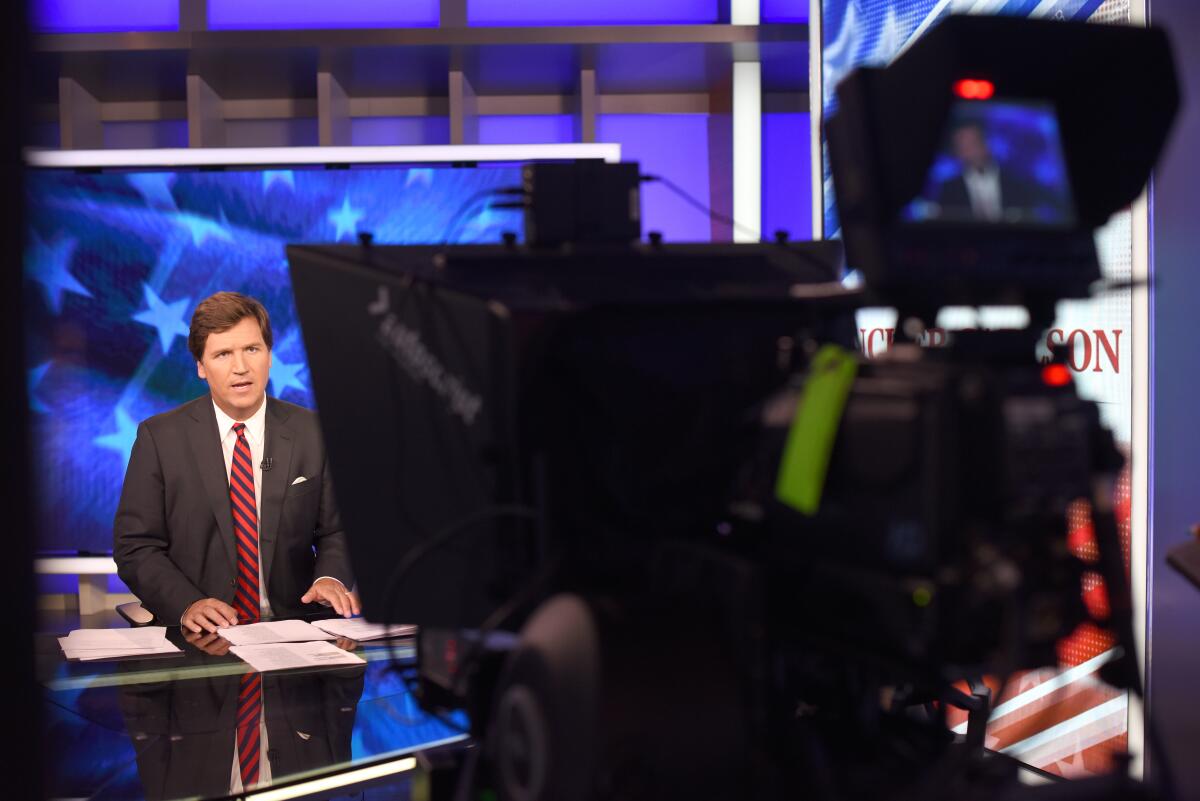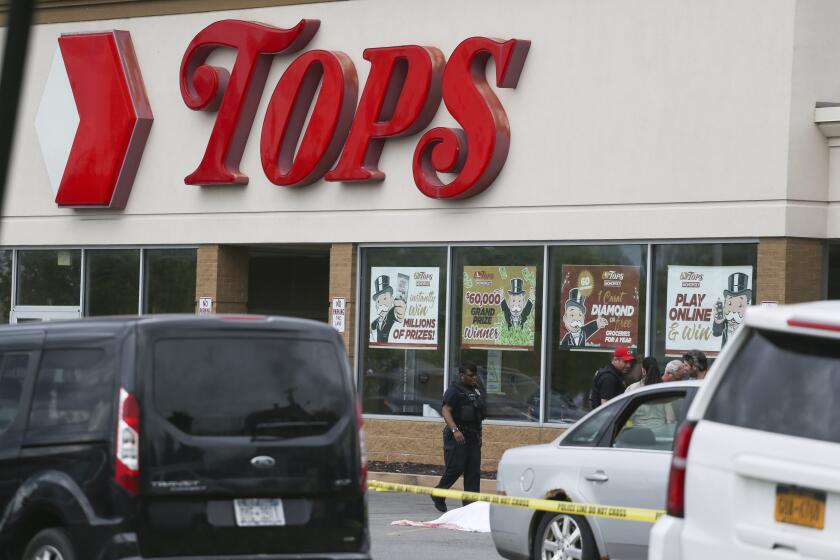After Buffalo, will social media companies finally ban great replacement theory?

- Share via
The Buffalo, N.Y., mass shooting that claimed 10 lives Saturday was an event shaped by, and for, internet platforms, including message boards and streaming and social media sites.
Now, as the predominantly Black neighborhood that suspected killer Payton Gendron targeted is left reeling, whether those platforms allow their users to promulgate the racist “great replacement theory” that appears to have motivated him has become a matter of public safety.
In the past, the major social media companies have cited a clear connection to real-world violence as an impetus for cracking down on specific categories of extremist speech. After having long allowed Holocaust denial under the banner of free speech, Facebook ultimately banned such posts in 2020 in response to rising rates of antisemitic violence. It also banned the QAnon conspiracy movement for similar reasons, saying that even QAnon content which didn’t itself call for violence could still be “tied to different forms of real world harm.”
The young white man who killed 10 people in Buffalo represents a new generation of white supremacists: isolated and online, radicalized on internet memes and misinformation, inspired by livestreams to find fame through bloodshed.
In theory, the massacre in Buffalo could mark a similar moment of truth for the great replacement theory, which claims that white people are being “replaced” by non-white groups, and which Gendron referred to repeatedly in a 180-page manifesto posted online before the spree.
But it’s not clear that that’s how things will actually play out, given the political pressure weighing on social media companies and the embrace of similar rhetoric by some of the right’s most prominent figures.
Representatives from Twitch, Facebook and Twitter did not immediately respond to a request for comment as to what specific strategies or rules they use to moderate great replacement theory content. A YouTube spokesperson did not immediately offer comment.
On most of the big social platforms, hate speech that’s directed at a specific group, as well as related threats of violence, would typically already constitute a terms of service violation, said Courtney Radsch, a fellow at UCLA’s Institute for Technology, Law and Policy. What the Buffalo shooting could do, she said, is give tech companies some latitude to more aggressively enforce those rules.
In the 1990s, Republicans spread fear over people of color “replacing” white people in California. It’s tenet of white supremacy we must confront.
“I think that when you do see a link to real-world violence, and such a direct link, that that will provide greater cover” for cracking down, Radsch said.
“However,” she said, “it’s going to be a very challenging situation because so much of that speech is happening in the far right; you’ve got this cover of Tucker Carlson and Fox News.”
A New York Times analysis of 1,150 episodes of Carlson’s Fox show “Tucker Carlson Tonight” identified racial replacement fear-mongering as a consistent through-line, including more than 400 episodes in which Carlson claimed that Democrats (and some Republicans) are trying to use immigration policy to change America’s demographics.
Because there’s already a perception among some conservatives that social media companies are biased against right-wing content — a notion that research refutes — cracking down on great replacement theory-related posts could put the platforms in politically dicey waters, Radsch said. “That will maybe make it more difficult for these platforms to take action.”
Wendy Via, co-founder and president of the Global Project Against Hate and Extremism, said that because social media platforms often treat the powerful and well-connected with kids gloves, Carlson — and other ideologically aligned politicians such as J.D. Vance and Jim Jordan — “do not get moderated the way that anybody else does.”
“Great replacement content is going to proliferate out of control because the ones that are pushing it” enjoy preferential treatment, Via said. “It’s allowed to go through.”
It’s not a new problem.
After the 2019 mass shooting in Christchurch, New Zealand, that targeted multiple mosques, Facebook “took action immediately” to deprive great replacement theory advocates of a platform, including the group Generation Identity, Via said. (When Facebook’s list of “Dangerous Individuals and Organizations” that can’t be praised on the platform leaked last year, several European branches of Generation Identity were on it.)
But the problem, Via said, is that such efforts happen at a drip-drip pace and play out unevenly across different social networks.
“It takes these big things to get them to take action,” she said, but even then, “they don’t go from zero to 100. They go from zero to 20.… They need to go from zero to 100, not halfway to it, but it takes people dying to get them to move [even] incrementally.
“But I do believe that they will move incrementally [now].”
Oren Segal, vice president of the Anti-Defamation League’s Center on Extremism, was even less confident.
“I’m trying not to be a pessimist, but if the past is any indication, I don’t know how successful they’re going to be, or how much effort a lot of these companies are going to put in it,” Segal said, adding that similar cycles of corporate reform played out after the Christchurch shooting as well as the 2019 El Paso shooting that targeted Latinos and the 2017 white nationalist “Unite the Right” rally in Charlottesville, Va. The great replacement theory played a central role in both.
“This is rinse and repeat,” Segal said. “Ultimately, do those changes that they make in response to tragedy have a lasting impact?”
That figures as influential as Carlson are pushing the ideology behind this latest tragedy may discourage platform companies from attempting to combat its spread, but it shouldn’t, Segal said.
“The fact that the ‘great replacement’ is not just becoming ubiquitous on some fringe extremist space but also in our public discussion,” he said, “suggests that there’s more of a reason for them to take a position on [moderating it], not less.”









